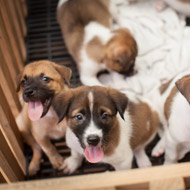Ban on third-party puppy and kitten sales confirmed

"This is a real victory for grassroots campaigners as well as the UK’s dogs and cats" - Marc Abraham.
Third-party sales of puppies and kittens will be banned under new legislation announced by the government.
The ban, known as ‘Lucy’s Law’, means that anyone planning to buy or adopt a puppy or kitten under six months must deal directly with the breeder or with an animal rehoming centre.
Campaigners hope it will bring an end to puppy farming and make it harder for high volume low welfare breeders - both licensed and unlicensed - which are reliant on third-party sellers.
Animal welfare minister David Rutley said: “This ban on third-party sales of puppies and kittens is part of our commitment to make sure the nation’s much-loved pets get the right start in life.
“I pay tribute to the Lucy’s Law campaign and the many stakeholders who have passionately campaigned for this ban. Today’s decision builds on our previous action in this area, including banning the sale of puppies under eight weeks and tackling the breeding of dogs with genetic disorders.”
Lucy’s Law campaign founder and TV vet Marc Abraham said: “This is a real victory for grassroots campaigners as well as the UK’s dogs and cats. On behalf of my phenomenal Lucy’s Law team I thank the government, and every animal lover, ethical animal welfare organisation, parliamentarian, and celebrity that’s helped make Lucy’s Law’s ban on third-party puppy and kitten sales a reality.”
The decision was taken following a public consultation, from which there was more than 95 per cent support for a ban.
Battersea’s chief executive Claire Horton said: “Battersea welcomes today’s government confirmation that third-party sales of puppies and kittens will be banned. Properly enforced, this will help put an end to dogs being used as breeding machines and kept in shocking conditions.
“The days of unscrupulous puppy dealers lining their pockets with no regard for animal welfare must now come to an end. This ban makes breeders properly accountable for the puppies they produce and will now give future owners the reassurance that they can adopt their new dog or cat from a safe and trusted source and ideally from a rescue centre.”



 The Veterinary Medicines Directorate (VMD) is inviting applications from veterinary students to attend a one-week extramural studies (EMS) placement in July 2026.
The Veterinary Medicines Directorate (VMD) is inviting applications from veterinary students to attend a one-week extramural studies (EMS) placement in July 2026.